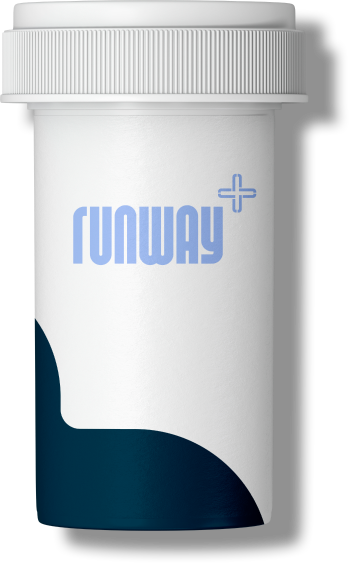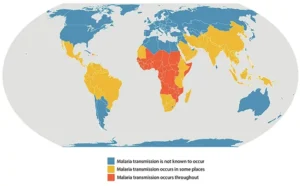

Delivered Straight to your door.
$129 plus $30 consultation fee


Step 1
Select your medications and fill out a quick, online questionnaire. Your physician will evaluate if medication is appropriate for your trip.

Step 2
Once your prescriptions are approved, we’ll send medications directly to you with fast and free shipping.

Step 3
Have questions along the way? Your physician is available for chat based care before, during and after your travels.
What it costs
A Runway consultation costs a fraction of a travel clinic and our medications are priced below average retail pricing. You are only charged if prescribed.

No searching for a doctor
Medication shipped directly to you
Transparent pricing
No wait times
vs
Limited access to travel clinics
Pharmacy availability not guaranteed
Unknown pricing
Average 24 day wait for a doctor appointment
Consultation Fee

Where does malaria most frequently occur?
Malaria transmission occurs across 87 countries and territories. The map below, provided by the Centers for Disease Control and Prevention, shows an approximation of the parts of the world where malaria transmission occurs.

Malaria is a tropical parasite disease that is primarily spread through mosquitoes. It can be life threatening. Malaria is not common in the United States, but it can be spread through immigration and travel from other countries where malaria is prevalent. Malaria is most common in warm, tropical climates such as Africa, South and Southeast Asia, the Middle East, Central and South America, and Oceania.
Malaria is primarily spread when an infected mosquito bites a non-infected person. The malaria parasites travel through the bloodstream and travel to the liver. After the parasites mature, they multiply in red blood cells, destroying them.
Malaria is not contagious person to person.
Symptoms are delayed, first occurring 7-30 days after infection and generally last 6-10 hours and cycle every 2 to 3 days. Malaria symptoms include shivering, fever, headache, vomiting, sweating, seizures, and fatigue. When left untreated, malaria can become severe and cause death.
Malaria transmission occurs across 87 countries and territories. The map below, provided by the Centers for Disease Control and Prevention, shows an approximation of the parts of the world where malaria transmission occurs.
Atovaquone:Proguanil is a more affordable, generic form of Malarone that is just as effective.
Atovaquone:Proguanil (generic Malarone) is effective against most types of malaria, including Plasmodium falciparum, which is the most common and dangerous form of the disease.
Although the exact dosing instructions will be provided by your healthcare provider, in general, it is recommended to start taking atovaquone:proguanil (generic Malarone) 1-2 days before entering the malaria zone, continue taking it daily during your stay, and then continue for 7 days after leaving the area.
While this medication helps prevent malaria, it does not provide protection against mosquito bites. It is still important to take additional measures to avoid mosquito bites, such as using insect repellents, wearing long sleeves and pants, and staying in screened or air-conditioned accommodations.
IRL
Runway offers travelers like you, the medications you may need before you go.